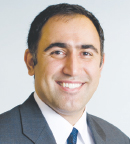
Amir Fathi, MD

Eunice S. Wang, MD
Commenting on this study, Amir Fathi, MD, a hematologist/oncologist at Massachusetts General Hospital and a co-investigator on the study, expressed hope about this new targeted approach. “Ivosidenib is an oral targeted inhibitor of the altered isocitrate dehydrogenase-1 (IDH1) protein. This presentation detailed the experience of an important phase I study of targeted treatment of IDH1-mutated acute myeloid leukemia (AML). The drug is well tolerated and leads to a complete remission rate of 24% and a higher rate of overall response of over 40%. The study also demonstrated an impressive median duration of response among treated patients, many of whom had relapsed or refractory disease. The emergence of this class of targeted agents for IDH-mutated myeloid malignancies provides a significant therapeutic option for affected patients,” Dr. Fathi said.
‘Fertile Area of Research’
Formal discussant, Eunice S. Wang, MD, of Roswell Park Comprehensive Cancer Center, Buffalo, New York, said, “IDH-targeted therapy is a fertile area of research. IDH mutations are a highly attractive therapeutic target. They are found in up to 25% of all newly diagnosed patients. Ivosidenib is a first-in-class reversible inhibitor of mutant IDH1. Response rates and median time to first response are similar with enasidenib [Idhifa]. The conclusions are striking and highly similar to those of studies of enasidenib.”
“Based on these data, ivosidenib is likely to become a new standard of care for relapsed/refractory patients with IDH1-mutated AML. We should carefully consider whether testing for mutations should become standard of care for all relapsed/refractory patients,” she continued.
“This drug is currently being studied upfront in newly IDH-mutant diagnosed AML. The future of IDH inhibitors may be in combinations. A preliminary study suggests that either drug combined with chemotherapy is well tolerated,” she stated. ■
DISCLOSURE: Dr. Fathi is a consultant for Celgene and Takeda; is on the advisory board of Agios, Pfizer, and Celgene; and has received research funding from Celgene and Seattle Genetics. Dr. Wang has served as a consultant or advisor for AbbVie, Amgen, Arog, Immunogen, and Pfizer and is on the speakers bureau for Novartis and Jazz Pharmaceuticals.

